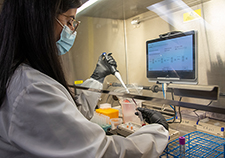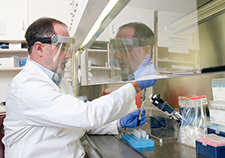Office of Research & Development |
 |
Office of Research & Development |
 |


Dr. Lynne McFarland, a research health scientist at the VA Puget Sound Health Care System, has studied which specific probiotic supplements are good for which specific conditions. (Photo by Christopher Pacheco)
June 27, 2018
By Mike Richman
VA Research Communications
"The problem is that patients waste money on a probiotic product that may not work for them, and they continue to suffer symptoms when the wrong probiotic is used."
Experiencing stomach discomfort, you go to a drug store in search of a dietary supplement known as probiotics. They are “healthy” bacteria that are important for the gut and can lead to better digestion and immune function, among other benefits.
You make the purchase, thinking you’ve found the probiotic that will ease your constipation and diarrhea symptoms.
But have you?
A new study finds there’s no one-size-fits-all solution when it comes to probiotics, a hot item today on the over-the-counter market. The researchers cite strong evidence that the ability of probiotics to be effective is both “strain-specific,” which means pinpointing a strain of a specific bacterium, and “disease-specific,” whereby it’s critical to match that strain to the right health condition.
But those two factors are often ignored when choosing the right probiotic, the researchers say. They add that reviews and meta-analyses often combine different types of probiotics, resulting in misleading conclusions of effectiveness.
Dr. Lynne McFarland, a research health scientist at the VA Puget Sound Health Care System in Seattle, led the study, which appeared in the online journal Frontiers in Medicine in May 2018. She’s also an associate professor at the University of Washington and gives lectures around the world on how to correctly use probiotics.

AI to Maximize Treatment for Veterans with Head and Neck Cancer

VA researcher works to improve antibiotic prescribing for Veterans

VA’s Million Veteran Program played crucial role in nation’s response to COVID-19 pandemic

VA Further Develops Its Central Biorepository: VA SHIELD
Most probiotics are sold as dietary supplements, which don’t require approval from the U.S. Food and Drug Administration (FDA). Thus, drug makers are not required to scientifically support their claims on labels.
McFarland urges customers to do their homework before making a purchase.
“Probiotics is a developing field, and while many researchers and experts keep up with the latest research and clinical trial results, not everyone gets the news on how to best use probiotics,” she says. “Consumers have to be their own advocate in finding good review articles that will help educate them on the type of probiotic that they need for their health condition.”
She adds: “The general perception by the public and many health care providers is that if a product is labeled `probiotic,’ it can be safely used for almost any disease. However, research in the past five to 10 years has determined that only specific strains of bacteria or yeast have proof of efficacy. This efficacy is specific for only some strains or mixtures of strains.”
McFarland explains, for example, that not all strains of the bacterium Lactobacillus rhamnosus, or L. rhamnosus, are effective for some diseases. L. rhamnosus strain GG, one of the most widely used probiotic strains, has worked well in preventing pediatric antibiotic-associated diarrhea (pediatric AAD). But other strains of L. rhamnosus have been ineffective in addressing that condition.
Conversely, she says, while L. rhamnosus strain GG may be effective for pediatric AAD, it has not worked well in clinical trials for other conditions, such as Crohn’s disease and travelers’ diarrhea. Both of those ailments affect the stomach and digestive system.
McFarland notes that although many types of probiotics are sold over-the-counter as “dietary supplements,” the FDA limits advice on the label to only “structure-function claims.” That means the label may say the supplement “improves gastrointestinal health” without mentioning the specific disease it is best-suited to target. Structure-function claims have long appeared on the labels of conventional foods, dietary supplements, and drugs.
“That is so general that it makes it impossible to know which diseases a particular probiotic is good for,” she says. “It’s an unfortunate loophole in the current regulations.
McFarland knows of cases in which patients consumed the wrong type of probiotic because the correct strain specificity and disease specificity weren’t on the label. She isn’t aware of situations in which this has significantly harmed the patient. But she notes that a lack of pertinent information can lead to negative consequences.
“The problem is that patients waste money on a probiotic product that may not work for them, and they continue to suffer symptoms when the wrong probiotic is used,” she says. “Fortunately, the risks when using the wrong probiotic are low.”
McFarland’s study comes as health-conscious consumers are hungry to find products that will produce the greatest medical benefits.
Probiotics are live microorganisms that are proposed as a treatment or preventative measure for ailments mainly in the digestive tract, such as irritable bowel syndrome and inflammatory bowel disease. They are also used for dental infections, skin problems, and allergies.
They are widely consumed as dietary supplements or in nutritional foods, such as yogurt, and are a low-cost, well-tolerated, non-antibiotic treatment strategy. Studies have shown that probiotics can slow down the spread of pathogens, occupying an area of the body that excludes bacteria from living in the same spot.
Almost all probiotics are sold over-the-counter. Consumers can buy them at a health food store, a vitamin store, a drug store, or a grocery store, as well as online.
Dr. Nasia Safdar, an infectious disease specialist at the William S. Middleton Memorial Veterans Affairs Medical Center in Madison, Wisconsin, agrees that understanding strain-specificity and disease-specificity are a must when it comes to probiotics. Over the years, she’s researched new ways to reduce health care infections through, for one, the use of probiotics.
She believes the FDA should require more details on the labels of probiotics.
“It depends on what the probiotic is being marketed for and what it’s being used for,” Safdar says. “But some of the claims that these probiotic manufacturers make are overarching vague things like improved gut health or improved overall sense of well-being. Those aren’t anything that’s measurable. How would you know if your gut health has improved? So in general, I think there needs to be more standardization of what’s required without making it so burdensome that it can’t be studied for its potential. Labels must include more precise information of how the consumer will benefit.”
Such ambiguity is also often evident when doctors prescribe probiotics, she notes.
“I think doctors look at the literature, and the literature may be that the name of a certain probiotic is mentioned as being helpful,” she says. “But that same probiotic doesn’t necessarily have to say what the amount is or specify the exact strain of what’s in the product. So we’re limited by what’s available. I may prescribe a probiotic if what I read seems promising, but I don’t know if exactly what I’m prescribing is what the patient is getting.”
The findings in McFarland’s study were based on a review of medical journals from 1970 to 2017 to assess whether probiotics are strain-specific and disease-specific. The researchers singled out trials on probiotics that had one strain or a mixture of strains and that had at least two well-done randomized controlled trials for each type of disease indication.
The scientists spotted evidence of strain specificity and disease specificity for probiotic strains in 228 trials. They found strong evidence for seven types of strains to prevent one of four conditions: adult or pediatric AAD; Clostridium difficile infection, or C. diff, which causes such symptoms as nausea and abdominal pain; nosocomial infections, which originate in a hospital; and travelers’ diarrhea.
Strong evidence also existed for 11 probiotic strains or mixtures to treat five types of diseases: acute pediatric diarrhea; irritable bowel syndrome; inflammatory bowel disease; C. diff; and Helicobacter pylori, or H. pylori. The latter condition causes inflammation and infection in the stomach.
“Evidence from this review shows that there is clear strain specificity and disease specificity for probiotic products,” the researchers write. “Every effort should be made to report specific probiotic strains or mixtures of strains when analyzing the [ability] and safety of probiotics. The clinical choice of the appropriate probiotic for each patient is challenging and requires both consideration of the type of probiotic strain(s) given and the type of disease indication for which it is needed.”
The scientists add that health care providers should take strain specificity and disease specificity into consideration when recommending probiotics. But whether there’s any trend toward their doing so is unclear.
“The recommendation of which probiotic to use for each patient will continue to be a challenge, but it’s not impossible to understand,” says McFarland, who meanwhile is working on a practical guide to probiotics that targets not providers, but consumers. “Reliance on current review articles and meta-analyses may be helpful. I would like to see the website of the National Institutes of Health updated to reflect the most effective designation for probiotic strains, but it is not there yet.”
She adds: “Currently, we strive to educate physicians and pharmacists on the appropriate choice for specific probiotic products for specific diseases, but universal coverage of this information has not been reached.”
VA Research Currents archives || Sign up for VA Research updates